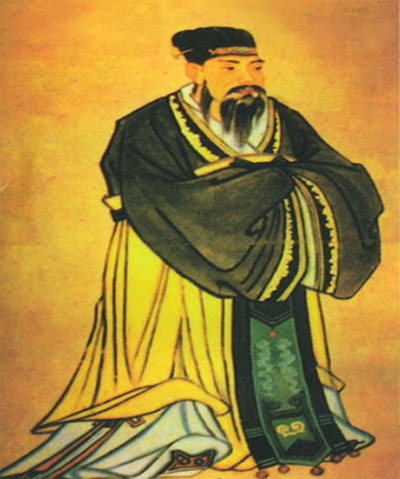Confucius

K'ung Fu Tzu (commonly pronounced Confucius in English) was born in 551 BCE in the state of Lu (modern day Shantung Province). He lived during the Chou Dynasty, an era known for its ethical vigilance. Later in life, he wandered through many states of China, giving suggestions to their rulers. He accumulated a small band of students during this time. The last years of his life were spent back in Lu, where he dedicated himself to teaching.
His writings deal primarily with individual morality and ethics, and the proper exercise of political power by the rulers.
In China, and some other areas in Asia, the social ethics and moral teachings of Confucius are blended with the Taoist communion with nature and Buddhist concepts of the afterlife, to form a set of complementary, peacefully co-existent and ecumenical religions.

Compared with his accomplishment in learning and moral development, his career was not so successful. He could not carry out his political ideal in his own state (Lu) and had to leave for other states, in the hope that he would be heard, his politics be practiced and his ideal be actualized somewhere else. For thirteen years, he and his disciples traveled from one state to another. In the end when he realized that there was no hope as such, he returned to his home state, devoting the rest of his life to teaching disciples and editing ancient classics, through which he expected that the disciples would carry on his will and bring his teachings to later generations. Traditionally he was credited to be the editor or writer of most of the important classics of Confucianism. However, the authentic materials, which contain his doctrines, is a collection of his sayings called the Analects, which was edited by his disciples or their students after his death.
Mencius

After the death of Confucius in 479 BC, some philosophers began to argue that the Confucian Way, or ren, was contrary to human nature. Although Confucius had said almost nothing about human nature, his later followers had much to say on this topic.
Mencius, a Confucian who lived in the 4th century BC, claimed that human nature was good. By this he meant that humans have inborn tendencies toward virtue. Without being taught, people have at least momentary feelings of compassion for the sufferings of others. Similarly, there are some things that people are too ashamed to do. According to Mencius, if we cultivate this feeling of compassion, it will develop into the virtue of benevolence. By the same token, if we cultivate our sense of shame, it will develop into the virtue of righteousness.
Mencius believed that it is the duty of humankind to cultivate the goodness inherent in our nature and to serve humanity. Because he thought that all humans already are disposed toward goodness, Mencius emphasized the importance of internal concentration or reflection in cultivating an ethical sense. He compared ethical cultivation to growing an adult plant from "sprouts".
Although the school was not specially influential during the period from the Han to the Sui dynasty, from the Tang dynasty it came to be regarded as the orthodox school in the line of Confucius and one of the key links in the chain transmitting the Way of the Sages. With the emergence of Neo-Confucianism during the Sung dynasty both the Doctrine of the Mean and the Book of Mencius came to be ranked, along with the Analects and the Great Learning, as the Four Books. Subsequently, Mencius himself came to be revered as the orthodox transmitter of the Confucian tradition after Confucius and the Second Sage next to Confucius, receiving for eight hundred years, till the beginning of this century, sacrifices both in the Temple of Confucius and in the temples devoted to him.
The doctrine of the School of Mencius is represented most clearly in two books. One is the Doctrine of the Mean, which is believed to have been written, edited or transmitted by Tzu Ssu, the grandson of Confucius and the disciple of Tseng Tzu, the youngest disciple of Confucius. The other is the Book of Mencius, which fully develops the ideas propounded in the Doctrine of the Mean.